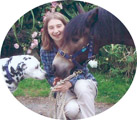| |||||||||||||||||||||||
| |||||||||||||||||||||||
What is Animal Communication? |
|||||||||
 |
|||||||||
| What is animal communication? People are often aware that their animals communicate with them through vocal sounds or body language…but what if we open our awareness to think about our everyday interaction with each other…is there more going on and how can this help us work together with our animals and understand them better? As humans, we think we rely mostly on words for communicating with eachother…but science tells us that only 7% of human communication happens through the actual words themselves! What is it then that we rely on to read and interact with eachother?It’s not just body language! We often forget about how our thoughts instil feelings and emotions within us, some of which we may feel VERY clearly - nervousness or anger, for instance. As humans, we are able to pick up on the feelings of others:
I believe the best way to describe this form of communication is the sharing of feelings and emotions. If this is something that we as humans do, then how does this apply to animals? Any horse-riders reading this article will almost certainly have experienced or witnessed that:
If your answer is yes, then you have already experienced sharing your feelings and emotions with your animal! This method of communicating with our animals through feelings and emotions is given the general term “Animal Communication” and this is the basis of how Animal Communicators work with animals. They are able to pick up on what the animals are sharing or are trying to share with us. Communicators are able work at an in-depth level with the feelings and emotions that animals share. Once a connection is made with an animal, a whole new opportunity opens for us to understand them better and help them. When an animal communicator makes a connection with an animal, it can choose to share images, feelings, emotions, sounds, tastes and sensations – the human takes all this on and then translates it into human words. Sometimes phrases might be used as the best way to describe a feeling. © Faye Stacey November 2009 | |||||||||
| More information on Faye Stacey of Understanding Animals | |||||||||
| Understanding Animals – Faye Stacey Understanding Animals offers you the opportunity to improve your relationship with your horse or pony…to know, understand and help them better and find resolutions to any horse’s behavioural, emotional or physical problems”. Faye is a qualified Animal Communicator and Reiki practitioner, combining her skills with practical experience gained rehabilitating wild and traumatised equines. Visit Faye’s website to find out more. www.understandinganimals.co.uk Based in Tiverton, Devon CLICK HERE to read Faye Stacey's web page on Equinetourism.co.uk |
|||||||||
Â
Â
ADVERTISE on Equinetourism.co.uk - Click here

Custom Search
Â
|
|||||||||
Â